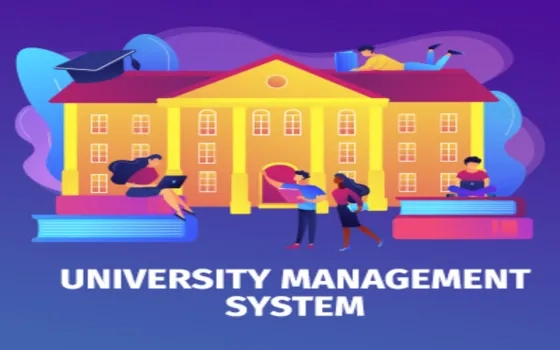What is a university management system?
A cloud-based university management system (UMS) is a digital solution that helps automate tasks. Ranging from registering students, admitting students, onboarding them, managing their fees, managing payroll for lecturers to helping students access online learning, classroom training etc. a university management system is a complete solution. Reducing manual labour and intervention, this system ensures accuracy, transparency, reliability, and integrity of records, information, intellectual property and data.
Features of a university management system
A UMS is an education ERP product that helps teachers, students, parents, external vendors, learning suppliers etc. come together via a platform and exchange information. The university administration can automate several of their processes such as attendance, announcements, results, campus updates, schedule changes etc. to all concerned persons. There is no limit on the number of features of the university management system because every university will have its own set of processes that is different from another university. Therefore, a UMS should be able to help universities apply university-specific customizations as well as configure generalized workflows.
- A universal university management system. India, UK, US curriculum, students and international learning systems can be integrated with such a system. The system links all university departments and coordinates their activities in an automated fashion.
- Eliminates data corruption either through willful misappropriation or by manual errors.
- Data/information security with strong encryption.
- The ability for customizations and extensibilities.
- Offline and online round-the-clock support.
University Management Software Types and Purposes
Academic software
The education ERP UMS monitors student progress, reports it, suggests improvements, automatically provides learning resources, manages online submissions, executes examinations and corroborates results. The university management system India, Europe, Americas UMS can also be configured to have automated convocation processes, with an automated degree and postgraduate degree delivery. The level of automation can be configured. A self-adjusting UMS will have no external or internal manual intervention. Most students prefer this type of system.
Finance and Accounting Management
This type of ERP for the University Management System should handle payments from students, suppliers, vendors. It can also provide reporting and financial statistics modules. Made for the university finance and administration department, an entire finance and accounting feature-set can be built-in. The feature-set can be specific to this type of university, and it's business.
HR software
An HR education ERP UMS helps the university administration to manage their employees. This UMS will have tracking capabilities including managing working hours, logging of tasks, completion deadlines and sharing of work. A UMS ERP should provide flexibility and adaptability. It means that the modules of the UMS ERP can be customized and applied as per business-specific requirements and also in a generalized way.
Department Management
A university is a complex organization of people, processes, departments and technologies. All the departments and people have to often work cohesively. The level of cohesion and collaboration requirements differs as per many factors such as nature of the task, departmental dynamics, university events and university processes. A UMS education ERP should support such complex departmental integration use-cases. Using UMS, departments should be able to work as siloes, transparently, collaboratively – all at the same time.
Inventory and Library Management
A university will have enormous types and quantities of inventory. The university could have complex supply chain processes. Likewise, a university’s digital library system may also need good knowledge management techniques. The library system could have educational resources being supplied from external learning providers. All of this needs management and manual management is not scalable. So an inventory and library management UMS help support stock-keeping and knowledge management in efficient and scalable ways.
Benefits of a university management system
Centralized Admissions
The UMS will help prospective students apply to the university online. The admission process can be automated with the education ERP software so that teachers don’t manually peruse the applications. The software will peruse the data and request additional data from the student if required. Data entry, verification, validation, storage can be automated. The admission module can also assist students in paying their admission fees, receiving acknowledgements, and online onboarding.
BI-Powered Analytics & Reports
The analytics and reporting module of the education ERP software can analyze data from various sources and produce reports. The analysis types can be modelled and configured. The data can be extracted from BI systems within the university or via integrations with cloud-based BI software. Analysis can be made on productivity, improvements, processes, student activities, teaching methodologies, and learning effectiveness. In fact, there is no limit on the types of analysis that can be made.
Choice Based Education System
Each university has a standard curriculum and also study areas that are electives. Students can choose from these electives via the education ERP software. This choice-based education system enables students to specialize in specific subjects. They gain expertise in those subject areas and can expand their horizons from there. A UMS should be able to provide these facilities. Online learning is one such mechanism that helps students with virtual labs, theory courses, practical based education, project work, feedback and results management.
Ease in Operation
Managing a university is a complex process. The aim of education ERP software UMS should be to reduce complexity and promote simplicity of operations. If the UMS itself is complex to operate, it defeats the purpose. Instead, a UMS should have intuitive and self-explanatory controls and UI components. Even non-technical users should be able to operate the system easily. When the system is easy to operate, more people start using it, as they find it more helpful and interesting.
Better Communication
Every department, entity, and function in the university has high levels of coordination. The UMS university ERP ensures that there is no scope for misunderstanding between any departments. All inter-departmental communication is transparent, recorded, and accessible. There could be personal and candid channels of communication as well. This aspect enables UMS administrators to leverage access based communication privileges.
Keeping Data Safe
Digital data is easy to record, access, transmit, and store. But if it is not managed properly, it can get corrupted or stolen. The UMS has to apply data redundancy technology to ensure that data is replicated. Disaster recovery mechanisms have to be put into place to ensure data resiliency. Access control lists and strong encryption will ensure that data cannot be accessed without authentication and authorization.
Better Pricing
A university ERP can have multiple modules. A university may need only a few modules and some modules on an on-demand basis. A modular approach ensures that a UMS can be priced as per user requirements. Being cloud-based also helps a UMS to scale only when there is increased usage, and shrink otherwise. This way, pricing can be non-rigid and helps universities to manage their costs, usage and resources efficiently.
Why Modern Universities Can’t Do Without Management Software?
There are three primary reasons why educational establishments should build university data management software.
Relevancy
A UMS is a bare necessity because education is becoming digital and online. Traditional classroom-based education is being replaced by virtual classrooms. The latter provides the same level of experience as the former. Added to that, virtual classrooms are a more powerful tool that enables a university to impart education to a wider and broader student base using the university ERP.
Efficiency
Manual entries, filling up papers, distributing pamphlets, putting announcements on physical bulletin boards are all inefficient. When all aspects of a university student administration process are online and automated, students have better leverage, control, and clarity. It saves time, cost, and confusion. Even teachers find that managing their activities, tasks, and scheduling is easier with a UMS. Teachers, faculty, and university administration personnel can focus on more creative tasks instead of wasting time on mundane repetitive tasks.
Flexibility
A UMS or university ERP provides the flexibility to define workflows as per changing university requirements. Hard-wired software-based workflows prevent the university from applying case-based workflows. Instead, a flexible and highly-configurable workflow system can support any number of use cases. It also lets the university expand its capabilities and offerings without worrying about a technological upgrade or overhaul.
Who needs a university management system?
Every university needs a university management system to stay competitive, in the reckoning, to win favour with students, and impart quality education. Without a UMS, a university will operate inefficiently and will be unable to create any value for the student community and teachers.
Source @ Camu Blog















![[Part 2/2] : Innovating Care: How HealthTech Startups Are Reshaping The Present and Future of Indian Healthcare](https://community.nasscom.in/sites/default/files/styles/560_x_350/public/media/images/ai-generated-9106907_1920-edited_0.jpg.webp?itok=xWs8wsoD)



